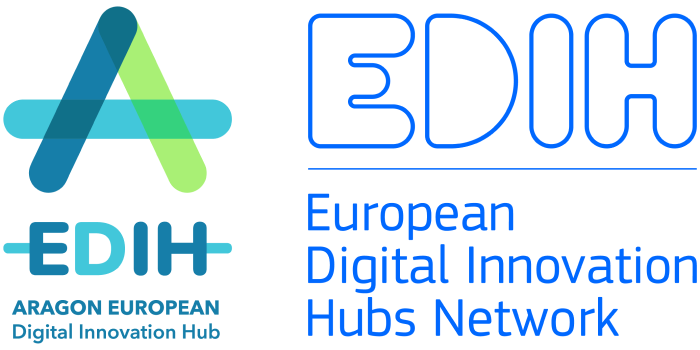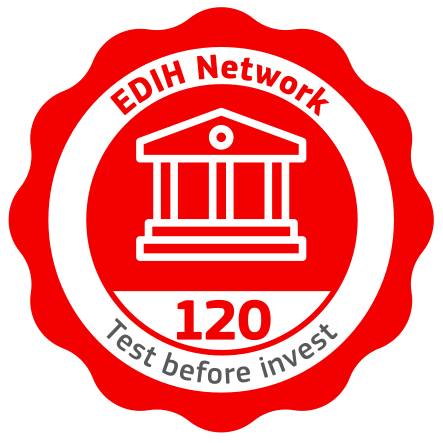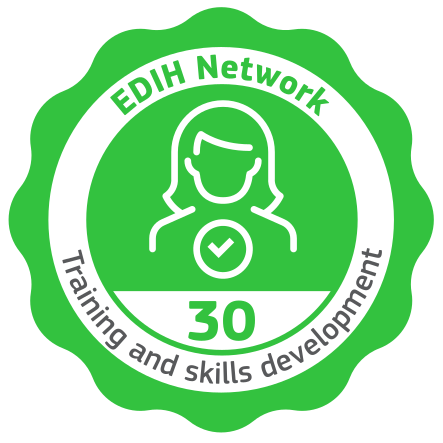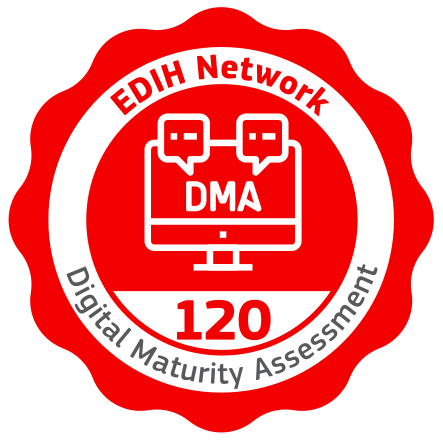Module 2:
Applications and tools for communication
Objectives
Area 2 of the DigComp program to be taught by AEDIH Academy, “Communication and collaboration”, aims to strengthen the capabilities of small and medium-sized companies in communication and collaboration through digital technologies, participating in society through public and private digital services and participatory citizenship. Managing one's own digital presence, identity, and reputation.
Program
Interacting through digital technologies (4h)
Interacting through a diverse range of digital technologies and understanding which digital communication channels are most appropriate in specific contexts.
- I can use a diverse range of functionalities in a video conference.
- I can communicate effectively asynchronously, through digital tools.
- I can use digital tools as a means of informal communication and for socializing.
- I know how to identify signs that indicate whether I am communicating with a person or with an AI-based conversational agent.
- I interact and provide feedback to the AI system to influence its next recommendations.
- I am aware of the need to balance asynchronous and synchronous communication activities.
Sharing through digital technologies (4h)
Share data, information and digital content with others through the most appropriate technologies and digital services, using the correct standards for citation and referencing.
- I know how to share digital content across a variety of devices.
- I know how to display and share information from my own device to support a message being delivered in a synchronous, online session.
- I know how to restrict access to the digital content I share.
- I know how to curate content on sharing platforms and therefore give added value to that shared content, for myself and for others.
- I know how to recognize the original source and authors of shared content.
- I know how to flag and/or report misinformation and false or erroneous news to entities whose purpose is to verify the veracity of the information, as well as to social media platforms, so that they do not continue to spread.
Getting involved in digital citizenship (4h)
Participate in society through the use of public and private digital services, seeking opportunities for self-training and participatory citizenship through the most appropriate digital technologies.
- I know how to request official digital certificates with which I can identify myself digitally in a totally secure way.
- I know how to track central, regional and local government spending, through digital environments.
- I know how to identify areas where AI can be beneficial for different aspects of daily life.
- I know how to get involved with other people through digital environments, in the sustainable development of society, being aware of the potential of technology both for inclusion and participation, as well as for exclusion.
Collaborating through digital technologies (4h)
Use digital technologies and tools to carry out collaborative processes, as well as for the co-construction and co-creation of data, resources and knowledge.
- I can use digital tools in a collaborative context to plan and share tasks, activities and responsibilities with
a group of friends, colleagues or family members.
I can use digital tools to facilitate and improve collaborative processes, such as shared task managers or horizontal brainstorming.
I know how to collaborate in a digital space for shared publications.
I know how to use digital tools and technologies to work remotely, to generate ideas in collaboration or to co-create digital content.
I know how to assess the advantages and disadvantages of digital applications when collaborating effectively with others.
Netiquette (4h)
Know and manage the rules of conduct when interacting in digital environments, adapting communication strategies to each specific target audience and being aware of cultural and generational diversity.
- I know how to stop receiving annoying or unwanted messages or emails.
- I know how to manage my own feelings when I talk to others online.
- I know how to recognize hostile or derogatory messages or activities in digital environments that attack specific people or groups of people.
- I know how to manage interactions and conversations in various sociocultural contexts and in situations specific to my own environment.
Managing digital identity (4h)
Create and manage one or multiple digital identities, so that one is able to protect one's reputation and appropriately treat the data one produces in various digital services, tools and environments.
- I know how to create and manage profiles in digital environments for personal and professional purposes.
- I know how to adopt communication and information practices to build a positive digital identity.
- I know how to perform a search for individual or family names to trace my own digital footprint in digital environments.
- I know how to verify and modify what type of metadata is included in images shared on the network so that I can protect my privacy and that of others.
- I know what strategies to use to control, manage or delete data stored or curated in digital systems.
- I know how to modify user settings to enable, prevent or moderate the tracking, storage and analysis of data by AI systems.
Who is it for?
It is aimed at professionals who are interested in learning about the importance of proper communication and collaboration with digital technologies and how to get involved in digital citizenship.
Requirements:
Basic
Modality
Mixed Training
Teachers
Isaac Bolea
Digital skills
Communication and collaboration:
- Interacting through digital technologies
- Sharing through digital technologies
- Engaging in digital citizenship
- Collaborating through digital technologies
- Netiquette
- Managing digital identity
Schedule, date and place
- Total duration: 24h
- Dates and times:
- In-person hours: Tuesday: March 18, 25 and April 1, 8 from 9:30 a.m. to 12:30 p.m.
- Online hours: Thursday: March 20, 27 and April 3, 10 from 5:30 p.m. to 8:30 p.m.
- Location:
- The in-person training hours will be held at:
TechnoPark Motorland
Dr. Joaquín Repollés Building
44600 Alcañiz
- The in-person training hours will be held at:
- Maximum number of attendees: 15 people





